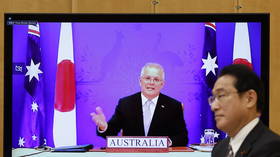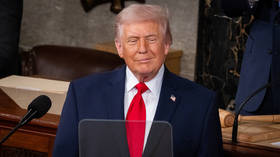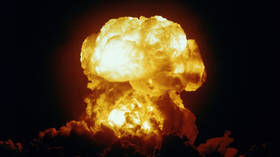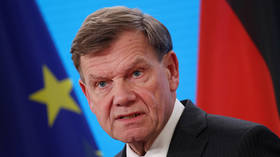Australia & Japan sign ‘landmark’ defense pact amid China tensions

A “landmark” defense deal has been signed by the governments of Australia and Japan, amid increased tensions with China in the Asia-Pacific. The pact sees the two nations commit to reciprocal military access.
On Thursday, Australian Prime Minister Scott Morrison and Japanese Prime Minister Fumio Kishida held a virtual meeting to put pen to paper on the Reciprocal Access Agreement.
“Japan is our closest partner in Asia, as demonstrated by our special strategic partnership – Australia’s only such partnership,” Morrison said, adding that it was “an equal partnership” based on the shared trust between two committed “democracies.”
The deal was a “pivotal moment for Australia and Japan, and the security of our two nations and our people,” he added.
Kishida described the agreement as “a landmark instrument which will elevate security cooperation between the nations to new heights.”
China was not mentioned at the signing ceremony, but the move, which is particularly significant for Japan, comes amid what other nations see as increased assertiveness from Beijing.
Speaking during a regular press briefing on Wednesday, Chinese Foreign Ministry spokesman Wang Wenbin said agreements between nations should focus on peace, and must “not target any third parties.”
The Reciprocal Access Agreement makes Australia the second country after the US, which has long been present in Japan, to have the right to station troops on Japanese soil. Soldiers from Japan will also be allowed to train and be stationed in Australia.
Negotiators and lawmakers have been in discussion for over a year in an effort to ensure the pact does not fall foul of Japanese constitutional and legal constraints.
Japan and Australia have both joined a diplomatic boycott of the Beijing Olympics.
Calls for Japan to drop its post-World War II constraints on militarization have grown louder in recent years as China has grown in power and assertiveness. The two nations have been engaged in a long-running spat over uninhabited islands in the East China Sea. Japan claims Chinese coast guard incursions into the area around the Senkaku Islands are a clear provocation.
Tokyo has also signed an American proposal to jointly defend Taiwan, which Beijing claims is an integral part of Chinese territory.
Last year, Australia signed the AUKUS deal with the UK and US, giving Canberra access to American nuclear submarine technology. The pact was seen as a challenge to China’s perceived ambitions in the Asia-Pacific, prompting Beijing to warn it would trigger an arms race in the region. Australia and China are also engaged in an ongoing trade war.












